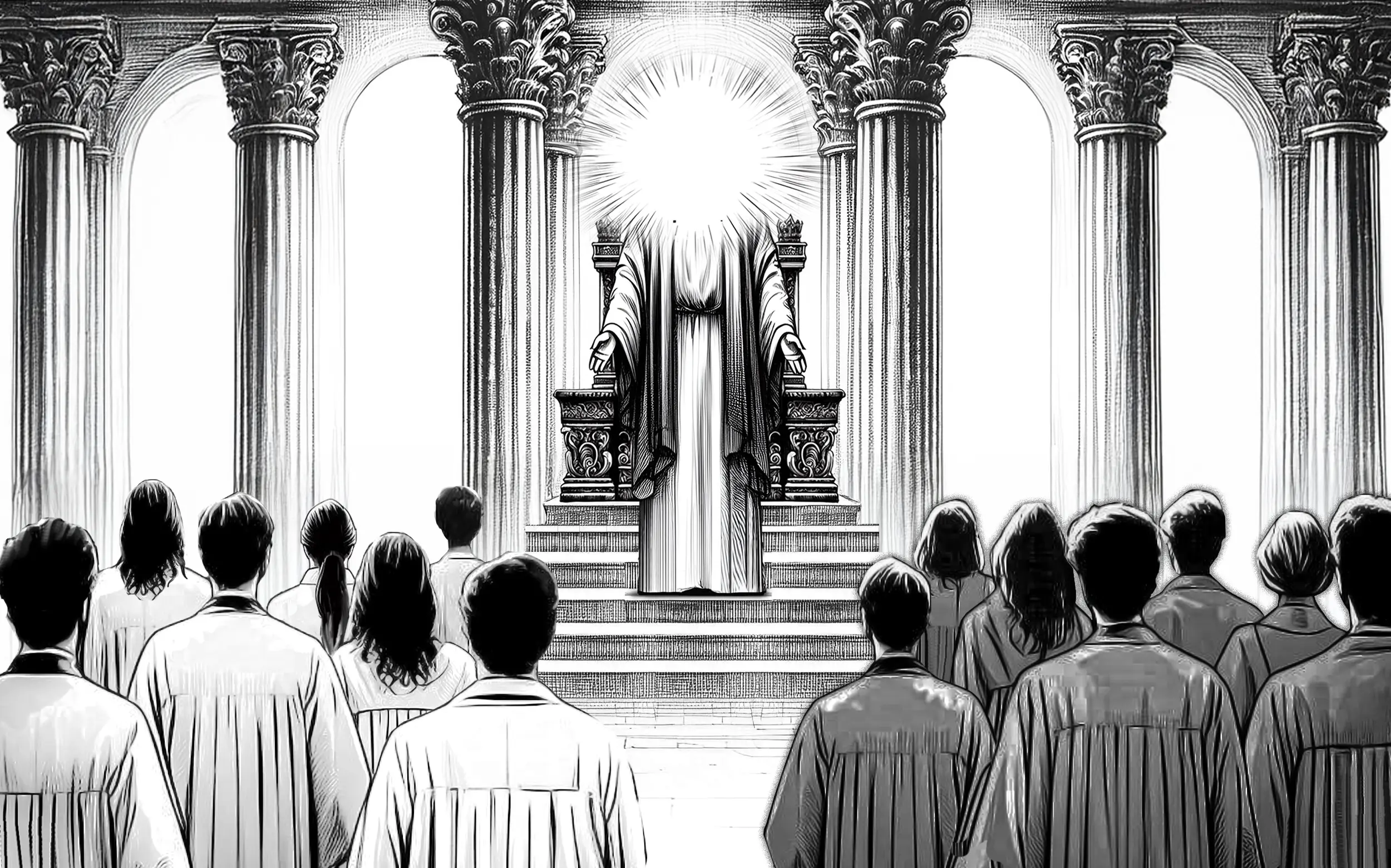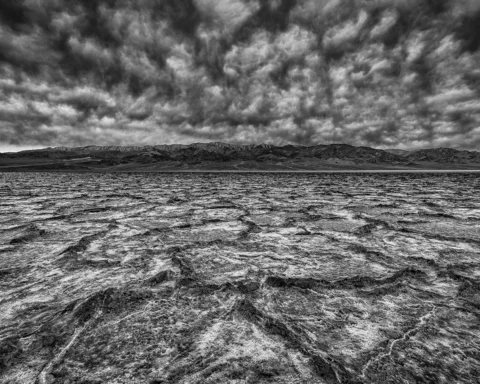ILLUSTRATION BY FIKI. © 2025 ISI.BIBLE
For we will all stand before the judgment seat of God…. So then each one of us will give an account of himself to God. – Romans 14:10–12
Porque todos compareceremos ante el tribunal de Dios … De modo que cada uno de nosotros dará a Dios cuenta de sí mismo. – Romanos 14:10–12
The Bible tells us that “God is love” (1Jn 4:8–10, 16; cf. Joh 3:16–18; Lam 3:22–23) and that He is “good,” “holy,” “righteous,” “faithful,” “merciful,” “full of grace,” “compassionate,” “patient,” “true,” and “perfect” (Lev 19:2; Psa 119:137; 1Co 1:9; Luk 6:36; Joh 1:14; Exo 34:6; 2Pe 3:9; 1Jn 5:20; Mat 5:48; cf. 2Sa 7:28; Psa 23:5–6; 57:3; 86:15; 2Jn 3; Tit 1:2; Rom 3:4; Lam 3:22–23; Jer 29:11; 1Ch 16:34). But we also read that He is a God of—
- “Justice” (Isa 30:18; Mat 12:18; Luk 7:29; 18:7; Rom 11:22; Heb 12:29),
- “Wisdom” (Pro 2:6; 3:19–20; 23:23; 24:3; Jer 10:12; Luk 7:35; Col 3:16; 2Ti 3:15; Jas 1:5; 3:13–17; Rev 7:12; Psa 136:5; Pro 8:22–29),
- “Law” (Psa 19:7; Luk 2:23–24, 39; Rom 7:25; Heb 8:10; 10:16), and
- “Order” (1Co 15:23; Tit 1:5; 1Co 14:33, 40; Act 11:4; 21:24; Jdg 6:26)
—and He will only allow Satan’s and humanity’s rebellion (sin) to continue for a while. “He has fixed a day” (Act 17:31; cf. Jud 14–15) still yet to come called “the day of judgment” (2Pe 2:9; 3:7; Mat 10:15; 11:22, 24; 12:36; Luk 9:26; 1Jn 4:17; cf. Mat 8:12; 10:26–28; 12:41–42; 13:40–43; 16:27; 25:31–46; Luk 10:12, 14; 11:31–32; Joh 5:22, 24, 26–29; Act 17:30–31; 24:25; Rom 2:2–3, 5–16; 12:19; 14:10–12; 1Co 4:5; 2Co 5:10; Php 2:10; Col 3:25; Gal 6:7–8; 2Ti 4:1; 2Th 1:6–10; Heb 6:2; 9:27; 10:27, 30; 12:29; 2Pe 2:4, 9; 3:1–13; Jud 6, 14–15; Rev 2:11; 3:5; 6:14–17; 11:15–19; 14:7; 19:1–5; 20; 20:10–15; 21:8, 27; 22:12; Psa 1:5; Ecc 12:14; Dan 7:9–10; 12:2–3), “in which He will judge the world [everyone] in righteousness” (Act 17:31; cf. Gen 18:25; Psa 7:11; 96:13; Act 10:42; Rom 2:5, 16; 2Ti 4:8; 1Pe 2:23; Rev 16:7).[1] This Day is also called:
- “The day of the Lord” (1Th 5:2; 1Co 5:5; 2Pe 3:10),
- “The day of Christ Jesus” (Php 1:6),
- “The day of our Lord Jesus Christ” (1Co 1:8),
- “The day of redemption” (Eph 4:30),
- “The day of eternity” (2Pe 3:18),
- “The day of salvation” (2Co 6:2), and
- “The day of wrath” (Rom 2:5).
This “day of judgment” will also be the very same Day that “the last trumpet” (1Co 15:52; cf. 1Th 4:16–17) of God sounds[2] and Jesus returns.[3] On that Day, He will appear in skies of “flaming fire” above for everyone to see and in the absolutely awesome, stunning, and indescribable full “power” and “glory” of God Almighty as He comes with “many thousands of His holy ones [angels],”[3a] as it is written, “When the Lord Jesus will be revealed from heaven with His mighty angels in flaming fire, dealing out retribution to those who do not know God and to those who do not obey the gospel of our Lord Jesus” (2Th 1:6–10; Jud 14–15; 24–25 Mat 16:27; 25:31–46; Luk 9:26; 2Co 3:18; 2Th 1:7–10; Tit 2:13; Rev 12:10; 15:8; 19:1; cf. Mat 24:30, 36–42; Luk 17:24; 21:27; Act 1:9–11; 22:6, 11; 26:13; Joh 14:1–3, 23; 1Co 15:52; 1Th 3:13; 4:13–18; 5:1–5; 2Th 2:1, 8; 1Ti 6:16; Heb 9:28; 12:29; 2Pe 3:1–10; 1Jn 3:2; Rev 1:7; 4:8; 22:12, 20). It will also be the “last day” (Joh 6:39–40, 44, 54; 11:24; 12:48; cf. Mat 16:27; 24:36–51; 25:31–46; 1Co 1:7–8; 15:22–25; 50–55; Php 1:10; 1Th 3:13; 4:15; 5:2, 23; 2Th 1:6–10; 2:1; 2Pe 3:7–13; Jud 14; Dan 7:9–11; Rev 1:7; 21:5; 22:20), the climax of human history (Rev 19:9; 20:11; 21:5), the very end of time itself that ushers in eternity (Mat 28:20; 25:46; Rev 22:5), and “the end, when He [Jesus] hands over the kingdom to the God and Father” (1Co 15:22–28; cf. 2Pe 3:1–13).
At that time, God has promised to “make all things new” (see Rev 21:1–5), eradicate all sin and sinful things from His creation (Psa 50:3; 97:3; Heb 10:26–31; 12:29; cf. 1Jn 2:17; Exo 24:17; Mal 3:2), and restore it and all those who chose to obey Him to “glory” (2Ti 2:10; Php 3:20–21; cf. 2Co 4:17).[4] Heaven will be where God and “righteousness dwells” (see Rev 21:3–4; 22:3; 2Pe 3:11–13) and where there is no more corruption, sin, suffering, disease, and death (1Co 15:26, 35–57; Heb 2:14–15; Rev 7:16–17; 20:14; 21:1–22:21; cf. Php 3:20–21; 1Jn 2:25; 3:2; Col 3:4; Jud 21; 2Pe 1:4; Joh 17:24; Rom 8:18, 29; 2Co 4:17; 5:1–8; Rev 1:18; 19:20; 20:10; 2Ti 1:10; Isa 25:8; Hos 13:14).[5]
WE WILL ALL STAND BEFORE GOD FOR JUDGMENT
On Judgment Day, everyone who has ever lived will be resurrected in immortal (but not all glorified/heavenly) bodies (Rom 6:5; 8:30; 2Co 3:18; Php 3:20–21; Col 3:4; cf. 1Jn 3:2; Act 24:15; Joh 5:25; 1Th 2:12; 4:16; 1Co 15:40–57; 2Co 5:1–4), and God will separate everyone into two groups: the “saved” and the “lost” (explained shortly; see Mat 25:31–33). “We will all stand before the judgment seat of God” (Rom 14:10; cf. Mat 25:31–32; 2Co 5:10; Jud 14–15) in the general assembly of humanity before the Supreme Court of the Lord (Rev 20:11–15; Mat 25:34–46; Dan 7:9–10). At that time, “As I live, says the Lord, every knee shall bow to Me, And every tongue shall give praise to God” (Rom 14:11; cf. Rom 15:11; Psa 72:11; Rev 5:14; 19:5); also written thus: “At the name of Jesus every knee will bow, of those who are in heaven and on earth and under the earth, and that every tongue will confess that Jesus Christ is Lord, to the glory of God the Father” (Php 2:10–11). Jesus is the Lord God Himself, and even those who did not believe in God and Jesus or obey the Gospel will bow down and declare that Jesus is Lord.[6]
Then judgment will happen. “Books [will be] opened” (see Rev 20:12; cf. Dan 7:9–10; Php 4:3; Rev 3:5; 13:8; 17:8; 20:15; 21:27), in which every thought, word, and deed you have ever had, said, and done in your life are recorded, and “each one of us will give an account of himself to God” (Rom 14:12; cf. Mat 12:36–37; Gal 6:5; 1Pe 4:5) and “be recompensed for his deeds in the body [flesh]” (2Co 5:10; cf. Gal 6:7–8; Col 3:24–25; Joh 5:29; Rom 14:10–12; Rev 2:23; 20:12–13; 22:12). At that time, “There is nothing covered up that will not be revealed, and hidden that will not be known. Accordingly, whatever you have said in the dark will be heard in the light, and what you have whispered in the inner rooms will be proclaimed upon the housetops” (Luk 12:2–3; cf. Luk 8:17; Mar 4:22; Mat 12:36–37; Eph 5:12). Remember, “nothing is hidden” from God (see Mar 4:22; Luk 8:17; cf. Mat 6:6–8; 10:26–27; Luk 12:2–3; 16:15; Joh 2:24–25; Act 15:8; 1Jn 3:20; 1Co 4:5; Rom 2:16; Heb 4:3, 12–13; Job 28:24; 34:21–23; 5:21; Psa 139; Pro 15:3; Isa 29:15; Jer 16:17; 23:24; Ecc 12:14; 2Ch 16:9; Rev 6:15–16)—not your “thoughts” (see Mat 9:4; 12:25; Mar 8:17; Luk 5:22; Psa 139:2; Isa 66:18; Eze 38:10; Heb 4:12) and not even the deep, dark “secret” things of the human “heart” (see Rom 8:27; Luk 16:15; 24:38; 1Co 4:5; Eph 5:12; 1Ch 28:9; Act 1:24; 5:3; 15:8; Heb 4:12–13; Jer 11:20; 12:3; 17:9–10; Psa 44:21; Ecc 12:14; Pro 24:12; Rev 2:23; 1Sa 16:7; 1Jn 3:20; cf. Rom 2:16; Luk 8:17; Mar 2:6–8; 4:22; Joh 2:24–25; Psa 139:1–4). He even knows the “motives” behind our actions (1Co 4:5; Pro 16:2; cf. Joh 2:24–25; Pro 21:2; Heb 4:12–13; Job 31:4; 34:21–22; Jer 23:24; Ecc 12:14; Psa 139:1–4).
The “saved”[7] (Mat 10:22; 19:25; Luk 7:50; 13:23; 23:35; Joh 3:16–17; 5:34; 10:9; Act 2:21, 47; 4:12; 15:11; 16:30–31; Rom 5:9–10; 8:24; 9:27; 10:9, 13; 1Co 1:18; Eph 2:8–9; 1Ti 2:4; Tit 3:5; 1Pe 4:18) will be those who can stand before God on that great Day and be declared “righteous” (Mat 13:43, 49; 25:37, 46; Luk 1:6; Rom 5:19; 1Pe 4:18; cf. Rom 5:17; 8:10; 1Co 1:30; Php 3:9), “justified” (Rom 3:24; 5:1, 9; Tit 3:7), and “holy and blameless” (Eph 1:4; 5:27; Col 1:22; cf. 2Pe 3:14; Act 24:16; 1Co 1:8; Php 1:10; 2:15; 1Th 5:23; Jud 24; Rev 14:5)—that is, “without sin” (Heb 4:15), declared “NOT GUILTY” of sin[8] (see Heb 9:28; Jud 24; Rom 6:10; 8:3). The “saved” will be “raised up” (see Joh 6:39–40, 44, 54) to “eternal life”[9] with God in heaven for eternity (see Joh 6:39–40, 44, 54; cf. Joh 3:15–16; Mat 25:21, 23, 34, 46; Rom 8:18; 1Co 15:42–57; 6:14; 2Co 3:18; 4:17; 5:6–8; Php 3:20–21; Col 3:4; 1Pe 5:6; 1Jn 3:2; Heb 9:28; Rev 21:3–4).
The “lost”[10] (Mat 10:6; 18:11; Luk 15:6; 19:10) will be those who chose to remain in their sins. They will be declared “unrighteous” (1Co 6:9–10; Gal 5:19–21) before God—that is, “GUILTY” of sin (Rev 22:11; 9:20–21; 16:9; 16:11)—because they did not obey God and refused “the free gift of God [which] is eternal life in Christ Jesus” (Rom 6:23; cf. Eph 2:8–9; Rom 5:17) through “the forgiveness of sins” (Col 1:13–14; cf. Jer 31:34; Psa 103:12; Isa 1:18) that God offered (through Jesus Christ). The “lost” will then be banished to hell for eternity (this is “eternal death”; see Mat 13:49; 25:31–46; Mar 9:44–49; Luk 16:26; 2Th 1:9; Rev 14:10–11; 20:15; 21:8; cf. Jud 15; Psa 1:5–6; 37:37–38; 73:17–19) along with “the devil and his angels” (Mat 25:41; cf. Rev 20:10) who sinned (rebelled against God). The “lost” do not go into annihilation[11] or nothingness after death (see Mat 10:28; 16:26; 25:46; Mar 8:36–37; Luk 12:20; 16:19–31; Act 24:15; Heb 9:27).[12], [13]
HELL IS A REAL PLACE OF TORMENT
Make no mistake: hell is a real, literal place of eternal “torment” (see Mat 8:12; 13:42, 50; 22:13; 2Pe 2:4; Jud 13; Rev 14:11; 19:20; 20:10–15). It is not a place you want to go to for even an hour, let alone for eternity. Hell is described as:
- A “place of torment” (Luk 16:28; Rev 14:11),
- “Eternal punishment” (Mat 25:46),
- “The lake of fire which burns with brimstone” (Rev 19:20; 21:8),
- “The eternal fire” (see Mat 18:8; 25:41; Jud 7),
- “The unquenchable fire” (Mar 9:43; Mat 3:12),
- “The furnace of fire” (Mat 13:50),
- “Where their worm does not die, and the fire is not quenched” (Mar 9:44, 46, 48),
- “The outer darkness; in that place there will be weeping and gnashing of teeth” (Mat 8:12; 22:13; 25:30),
- “The black darkness” (2Pe 2:17; Jud 13),
- “The second death” (Rev 21:8), and
- Where “the smoke of their torment goes up forever and ever; they have no rest day and night” (Rev 14:11).
Please understand that hell wasn’t created or intended for humans. It was “prepared for the devil and his angels” (Mat 25:41) who rebelled (disobeyed, sinned) against God (Rev 12:7–8; Jud 6; Eph 6:12)—humans were never supposed to end up there. If you end up in hell, it will have been by your own “choice” (see Jos 24:15; cf. Rev 22:11, 17; Pro 1:29; Joh 6:67–68) by not believing in or obeying God. God forces no one to come to Him, but He has “made known” in advance (Joh 15:15; Rom 16:26; Eph 1:9; 3:5; cf. Act 17:30–31; 13:38; Luk 24:47; Rom 5:6; 9:17; Gal 4:4; Col 1:23; 1Ti 3:16; Heb 9:26; 1Pe 1:20) what will happen to those who “chose” to remain in sin, disobeyed Him, and liked the things “of this world”[14] (see Mat 4:8; 13:22; Mar 4:19; Luk 4:5; 12:30; Joh 3:31; 8:23; 12:25; 15:19; Act 4:26; 1Co 1:20, 27–28; 2:12; 3:19; 5:10; 7:33–34; 2Co 4:4; 7:10; Gal 4:3; Eph 2:2; 1Jn 2:15–17; 2Pe 2:20; Rev 6:15; 13:11; 17:2, 5; 18:3–11; 23; 19:19; cf. Mat 6:19–21, 24; 16:24–26; 18:7; 19:16–24; Mar 8:34; Luk 8:4–8; 9:23; 14:26–27; Joh 12:31; 13:1; 14:30; 16:11; 17:6, 14–16; 18:36; Rom 12:2; Col 3:1–2; Php 3:19–20; 1Ti 6:9–10; 2Ti 4:10; Gen 19:26) more than Him.
Please also understand that God sends no one to hell—you send yourself there by refusing “the free gift of God,” which is “redemption” (Eph 1:7; Col 1:14), “salvation” (Act 4:12; 13:26, 47; 16:17; 28:28; Mar 16:20; Luk 1:77; 19:9; Rom 1:16; 10:10), and “eternal life” through Christ. God actually “desires all men to be saved and to come to the knowledge of the truth” (1Ti 2:4), “not wishing for any to perish but for all to come to repentance” (2Pe 3:9).
THERE ARE NO “SECOND CHANCES” AFTER DEATH
Please further realize your spiritual state is fixed and unchangeable for all eternity when you die (Luk 16:26)—you either die “righteous” (without sin, “holy and blameless”), or you die “unrighteous” (a sinner, wicked, ungodly). There is no further remedy after death (i.e., “second chances”; Heb 9:27; Luk 16:19–31); you must prepare to stand before God in judgment before you die or before Jesus returns, whichever comes first.[15]
THE RIGHTEOUS JUDGE
God is described as “the righteous Judge” (2Ti 4:8), and unlike in human courts of law, God can’t be swayed or convinced to change His mind by excuses or clever arguments of counsel, nor can He be bribed (Gal 6:7; cf. 1Co 1:20; 3:19; Gal 6:3; Job 38:1–3; Deu 10:17; Act 8:20; 2Ch 19:7; Pro 11:1; Col 3:24–25; Joh 5:29; Rom 14:10–12; Rev 2:23; 20:12–13; 22:12). There will be no discussing, arguing, pleading, wrangling, or negotiating with God on Judgment Day, trying to convince Him that you aren’t a sinner and that you deserve to be in heaven because you were basically a “good person.”[16], [17], [18] Additionally, race, creed, color, money, wealth, fame, power, political affiliations, birth heritage, prestige, advanced degrees, titles, and fancy initials placed before or after your name have no standing whatsoever before the Lord, who judges all equally, “righteously”[19] (see Gen 18:25; Isa 11:3–5; Psa 7:11; 9:8; 35:24; 72:2; 96:13; 98:9; 145:17; Act 17:31; Joh 5:30; 7:24; 8:15–16; 2Ti 4:8; 1Pe 2:23; Rev 16:5; 19:11; cf. Luk 16:15; 1Co 4:5; Gal 3:22; 1Sa 16:7; Jer 11:20), and “impartially”[20] (see Gen 18:25; Gal 2:6; 1Pe 1:17; Rom 2:11; 10:12; 11:32; Col 3:25; Job 34:19; Pro 22:2; Eph 6:9; Act 10:34–35; 15:9; 2Co 5:10; Deu 10:17; Isa 11:3–5).
You also cannot buy, earn (through works of merit), or purchase forgiveness of sins (and eternal salvation), for that is by the grace of God only through faith in and obedience to His Son, Jesus Christ. Only those covered by “the blood of Christ” (Eph 2:13; Heb 9:14; 1Pe 1:19; 1Co 10:16) will be “saved.”[21] Nothing and no one sinful or unclean will be allowed to enter heaven (1Co 6:9–10; Gal 5:19–21; Eph 5:3–5; Joh 8:21; Mat 13:41; cf. Heb 12:29; Rev 9:20–21; 20:12–15; 21:1–8, 23–27; 22:15; Luk 12:5). In fact, the entire purpose (and point) of the Gospel is to explain to you how you can stand before God on Judgment Day with your sins forgiven and be granted entrance into heaven (“Paradise”; Luk 23:43; 2Co 12:4; Rev 2:7). We are told that “ignorance” of God’s laws and of how He has enabled each of us to stand before Him without sin will not be an excuse on Judgment Day (see Act 17:30; cf. Hos 4:6; Rom 10:2; 2Co 2:11).[22] Therefore, this book is declaring the Gospel to you accurately and completely so you too can have “eternal life” (as opposed to eternal death)—if you so choose.
[1] Jesus Christ (who is God) will be your Judge; this is explained further in the section “Jesus Will Be Your Judge” in the chapter “Our Hope.”
[2] See also the “seventh angel” (Rev 11:15).
[3] Visibly and bodily (Act 1:11).
[3a] He will also bring back the spirits/souls of all who died in Christ (1Th 3:13; 4:13–14).
[4] That is, those who “called on the name of the Lord” (see Act 2:21; 22:16; Rom 10:13; 1Co 1:2; cf. Gen 4:26; Isa 12:4; Psa 91:14–15; 105:1; 116:4, 13, 17) as instructed to in Scripture and who kept His commandments (Joh 14:15, 21; 15:10; Joh 2:3–4; 5:2–3; Rom 2:13; Jas 1:22; Rev 12:17; 14:12). See also the chapter “Understanding Obedience.”
[5] A state of perfection as God originally intended in the Genesis creation (also “Paradise”; Luk 23:43; 2Co 12:4; Rev 2:7). See the chapter “All Things Made New.”
[6] Jesus, the “good news” of the Gospel, and salvation are all explained in upcoming chapters.
[7] The “sheep” (Mat 25:32–33; Luk 15:6; Joh 10:11, 26–27; 21:16–17; Psa 100:3), “saints” (Psa 16:3; 34:9; Dan 7:18–27; Mat 27:52; Act 9:32; Rom 1:7; 8:27; 15:26; 2Co 1:1; Rev 18:20, 24; 19:8; 20:9), and “righteous” (see Gen 18:25; Dan 12:3; Mat 13:43, 49; 25:37, 46; 1Pe 4:18; 1Jn 3:7; Rev 19:8) ones.
[8] In effect, God will issue a full “pardon” for all your sins (see Mic 7:18–19; Psa 25:11; 103:3; Isa 55:7; cf. Isa 1:18; Eph 1:6–8; Luk 6:37).
[9] See the chapter “Our Hope” for “eternal life” verse references.
[10] The “goats” (Mat 25:32–33), “wicked” (see Gen 6:5; 13:13; 18:23; Mat 13:49; Luk 11:39; Act 3:26; 24:15; Rom 1:29; 1Co 5:13; 2Th 2:12; 2Ti 2:19; Jas 1:21; Psa 1:4–6; 9:5, 16–17; 10:3–4), “ungodly” (Rom 4:5; 5:6; 1Ti 1:9; 2Pe 2:5–6; 3:7; Jud 4, 18), “disobedient” (of God; Luk 1:17; Rom 10:21; 11:30–31; Tit 1:16; 3:3; Heb 3:18; 1Pe 2:8; 3:20; cf. Rom 1:18–32), “immoral persons and sorcerers and idolaters and all liars” (Rev 21:8), “those who call evil good, and good evil” (Isa 5:20–23), and so on.
[11] That is another false teaching of man.
[12] For those who die in Christ (the “saved”), their body goes down into the grave, and their soul goes directly into the presence of the Lord in heaven still fully conscious, where they are comforted until the resurrection (Luk 23:43, 46; 2Co 5:6–8; Act 7:59; Php 1:23; Ecc 12:7; cf. Rev 6:9–11). For those who die without Christ (the “lost”), their body also goes into the grave, but their soul goes to “Hades” also fully conscious (Mat 11:23; 16:18; Luk 10:15; 16:23; Act 2:27, 31; 2Pe 2:9; Rev 1:18, 6:8; 20:13–14), which is a holding place for unsaved souls until the Day of Judgment. You do not “soul sleep” or go unconscious at death. For more information, see our book Beyond the Tomb.
[13] In OT Hebrew, sheol is used to describe the realm of the dead. In NT Greek, hades is the word used. Hades is not the final destination of the lost—their eternal home will be “the lake of fire” (i.e., eternal punishment, also hell, Greek gehenna: the place of punishment; Rev 19:20; 20:10, 14–15). Gehenna is the Greek transliteration of the Hebrew “valley of [the sons of] Hinnom,” where babies were sacrificed (burned) to Molech and where refuse was subsequently dumped and burned in a fire which smoldered constantly (see Jos 15:8; 2Ki 23:10; 2Ch 28:3; 33:6; Jer 7:32; 32:35). See also https://christiancourier.com/articles/the-use-of-hell-in-the-new-testament.
[14] Also “of the world,” “in this world,” “in the world,” and “of the earth.” Moreover, this world is “passing away” (see Mat 5:18; 24:35; 1Co 2:6; 7:31; 1Jn 2:8, 17; Luk 16:17; 21:33; 2Pe 3:5–10; Rev 21:4; cf. 2Co 4:18).
[15] Some will still be alive when Jesus returns (1Co 15:51–52).
[16] There also won’t be an endless appeals process, as there is in earthly courts of law.
[17] As explained prior, “the devil made me do it” and “God made me this way” excuses won’t work either.
[18] It doesn’t matter what you think about yourself; what matters is what God has told us, which is “there is none righteous, not even one” (Rom 3:10) and “All have sinned and fall short of the glory of God” (Rom 3:23).
[19] Correctly and without error.
[20] Without partiality, justly, fairly; that is, equal justice no matter who you are or what you have done. Everyone is equally a sinner before God (Rom 3:10, 23; 11:32; cf. Gal 3:22; 6:7).
[21] It is only the righteousness of Christ that cleanses us of our sins (i.e., covers us).
[22] This warning about being ignorant applies in the extreme to those of us living today, for we have easy and ready access to the entire Word of God like never before in history (Luk 12:47–48; Act 17:30; Joh 15:22; Heb 10:29; cf. Mat 25:14–29), and along with greater access to truth (Scripture and the Gospel) comes a greater responsibility to respond to it.






